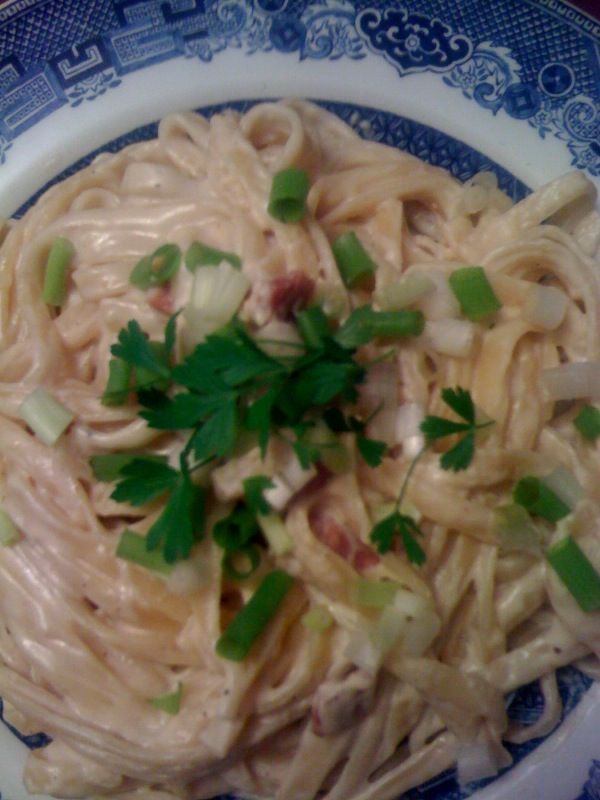Alfredo sauce is a beloved pasta dish made with a creamy white sauce consisting of Parmesan cheese and butter. While cats can technically consume Alfredo sauce, there are a few important considerations to keep in mind. Most commercially prepared Alfredo sauces contain garlic, which can be toxic to cats in large quantities. Additionally, the sauce often contains high levels of fat and sodium, which can lead to digestive issues in some feline friends. If you’re thinking of sharing Alfredo sauce with your cat, it’s crucial to consult your veterinarian first. They can provide guidance on whether it’s safe for your cat to consume and in what amount.
Is Alfredo Sauce Safe for Cats?
Alfredo sauce typically consists of butter, heavy cream, and Parmesan cheese, all of which are generally safe for cats. However, many Alfredo sauces contain garlic, which can be harmful to our feline companions. Therefore, it’s essential to ensure that the sauce you offer your cat is free from garlic or any other potentially toxic ingredients. If you’re unsure about the safety of Alfredo sauce for your cat, consult your veterinarian for expert advice.
Can I Give My Cat Pasta Sauce?
Pasta sauces often include seasonings like onions, garlic, and various herbs, which can be harmful or toxic to cats. It’s crucial to avoid feeding your cat pasta sauce that contains onions or garlic. These vegetables are known to be toxic to cats and can pose serious health risks. While tomato sauce itself isn’t toxic, consuming large amounts of it can lead to illness in cats. To keep your cat safe, it’s best to avoid giving them spaghetti sauce unless it’s specially prepared without any harmful ingredients. If you’re unsure about the safety of a particular sauce, consult your veterinarian to ensure your cat’s well-being.
What Sauce Can Cats Eat?
Red sauces that typically contain ingredients like ripe tomatoes, olive oil, and seasonings such as basil and oregano are generally safe for cats. However, it’s essential to be cautious when choosing pasta sauces for your feline friend. Homemade or store-bought tomato sauces may contain toxic ingredients like onions and garlic, which can be harmful to cats. Always check the ingredients list to ensure the sauce is free of any substances that could endanger your cat’s health. When in doubt, consult your veterinarian for guidance on suitable sauces for your cat.
Conclusion
While sharing a meal with your furry friend can be a delightful experience, it’s crucial to make informed choices about the foods you offer them. When it comes to Alfredo sauce and other pasta sauces, it’s important to consider the potential risks associated with ingredients like garlic and onions. To keep your cat safe and healthy, consult your veterinarian for personalized advice and guidance. Remember, your cat’s well-being should always be a top priority.
Frequently Asked Questions
Q: Can cats eat tomato sauce?
A: Cats can eat tomato sauce in moderation, as long as it doesn’t contain any harmful ingredients like garlic or onions. Keep in mind that consuming excessive amounts of tomato sauce can lead to illness in cats.
Q: Is pasta safe for cats to eat?
A: Plain pasta made from flour, water, and eggs is generally safe for cats to consume. However, it’s important to avoid giving cats pasta with sauces that contain ingredients like garlic, onion, or other potentially harmful substances.
Q: Can cats eat spaghetti Bolognese sauce?
A: It’s best to avoid feeding cats spaghetti Bolognese sauce, as it often contains onions and garlic, which can be toxic to felines. To keep your cat safe, opt for cat-specific foods rather than sharing human meals.
Q: What human foods are safe for cats?
A: Some human foods that cats can safely enjoy include cooked chicken, turkey, and fish. However, always remember to offer these foods in moderation and consult your veterinarian for specific dietary recommendations.
For more informative content on pet care and to explore the world of cats and dogs, visit Pawsoha.


